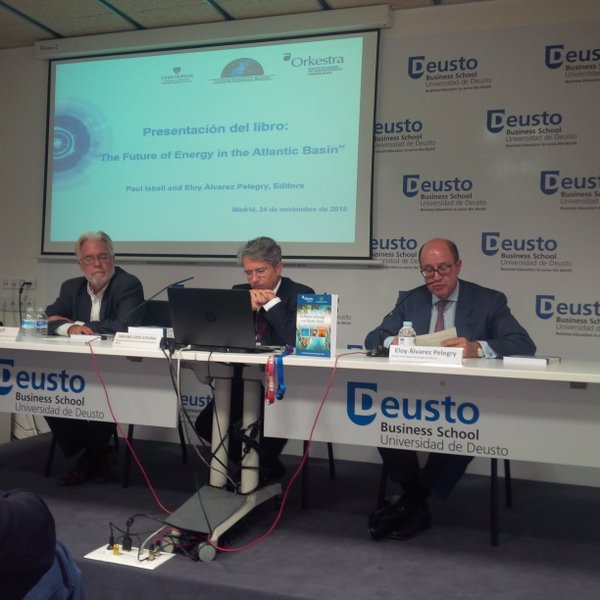24 November 2015

Orkestra's Energy Department and the Center for Transatlantic Studies of Jonhs Hopkins University have presented the book “The Future of Energy in the Atlantic Basin”, which examines the Atlantic Basin potential faced with the new energy scenario, at Deusto Business School in Madrid.
The book explores the revolution that is being experienced by the Atlantic basin in terms of energy production, distribution and marketing. It also deals with the impact that non-conventional energies like shale gas, offshore energy and low carbon energies have on the fall in oil prices, energy innovation and, consequently, in shaping the new global energy map.
The book results from a seminar on this subject that was organised by Orkestra’s Energy Chair jointly with Johns Hopkins University in October 2013. It is structured into three main parts that include: the new trends in the Atlantic and global energy scenario regarding fossil conventional and non-conventional energies, renewable energies, biofuels and regional and global trade flows; the scenario in Africa and Latin America, from the perspective of renewable energies, gas and oil, regional energy integration and energy policy and reform; the evolution of the European Energy policy form the private sector standpoint, the dynamics of the sub-state territories of the basin and the emerging energy role of the Atlantic coast.
Throughout its chapters, which cover a wide range of issues concerning the Atlantic Basin, the book presents its growing strategic value, from the energy perspective as a whole, from North to South. Thus, it concludes that this multifaceted space provides a source of opportunities that would place it as the epicentre of world energy reserves and export of various types of energy towards the basins of the Indian and the Pacific in the future; against the role it has been playing mainly as an energy importer and consumer in the Middle East.
As part of the book presentation, Emiliano López Atxurra, Energy's Sponsor Committee President, Eloy Álvarez Pelegry, director of Orkestra’s Energy Chair and Paul Isbell, CAF Atlantic Energy Fellow of the Center for Transatlantic Relations at Johns Hopkins University agreed on the need to consolidate an “Atlantic world” before the rise of the Pacific region, where the communities and institutions that make up the Atlantic basin share interests and focus their policies on the potential offered by this territory for this new scenario to become a reality.
To this end, the Atlantic Basin Initiative was created in 2013 and, in 2014, faced with the need to establish closer ties to pursue pan-Atlantic cooperation on energy, led to the creation of the Atlantic Energy Forum.
The presentation of this book coincides with the celebration of the 2nd Energy Atlantic Forum held this month in Mexico. This is the first of a series of works on Energy in the Atlantic Basin that is expected to continue in the future.












